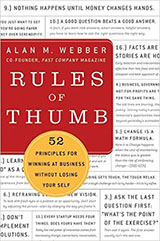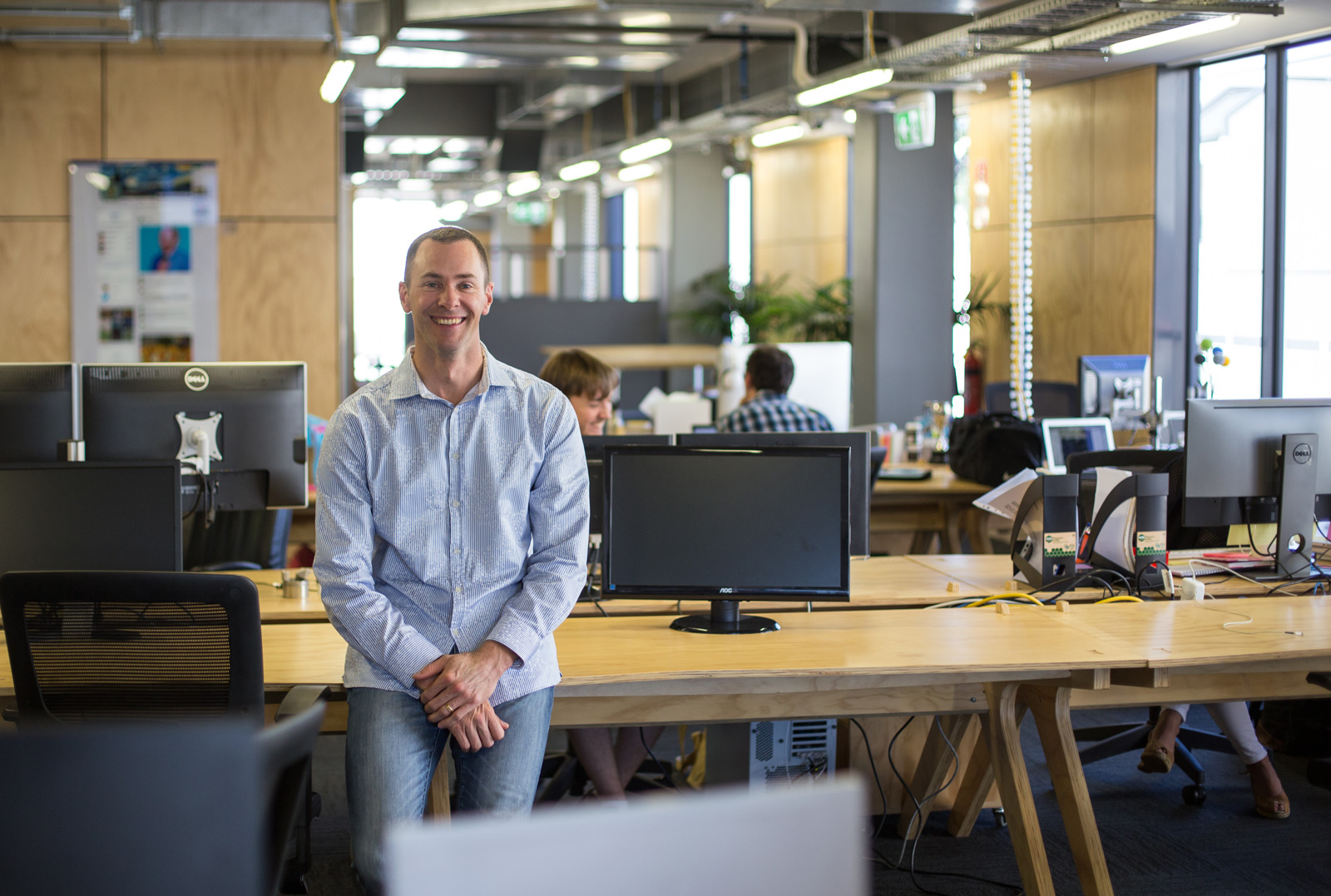My notes on “Rules of Thumb: 52 Truths For Winning At Business Without Losing Your Self” – by Alan M. Webber.
What business are you in?
- If you’re a journalist and you think you’re in the news business, chances are good you’re going to go out of business. News today is a commodity. But there’s a good market for the opinion business or event he funny business (eg Jon Stewart whom recently finished forth in the voting for America’s most trusted source of… news). None of them are in the news business; they’re successful because they are in the ideas-behind-the-news business.
- Learn to see with fresh eyes so you can differentiate your business from the competition.
- Change the way your business sees the market and the way your customers see your business.
- How? Start by asking a different question. Not “what is our product or service?” but “What does our product or service stand for?”
- Eg a supermarket chain could stand for healthier life for customers who are willing to pay more for organic food.
- Eg2 a coffee shop could stand for neighbourliness for the people in its surrounding community who use it as an informal gathering place
It’s time to stop thinking about the world in terms of developed and developing nations
- If you fly from Beijing to New York, which airport looks like a developing nation’s and which like the developed one’s? GE organises the world around new categories: natural-resource-rich-countries, people-rich countries, and technology-education-rich countries.
- Look for new and emerging categories. If you spot a category before it becomes conventional wisdom, you’ve got an instant advantage.
Questions are how we learn
- Which means questions are how we create change
- Questions are dangerous – 48 journalists were murdered last year for asking questions.
- Questions are liberating – asking the right question has led scientists to cure terrible diseases, architects to design amazing building and social activists to achieve peace in troubled parts of the world.
- Questions are useful – entrepreneurs and innovators usually start their search for something new and better by asking, “what if?” or “why not?”
- Questions are how we avoid disasters
Why trade off when you can have both?
- Toyota’s system produced both high quality and low cost. That was the game changer.
- In the old game you had to choose. It was either/or
- When you’re faced with a tough decision, which do you go with: your head or your heart? If you choose either, you’ve missed the point. Use both!
Facts are facts, stories are how we learn
- Fact version: “in 2008 health care spending claimed 15.4 percent of the US GDP. That ranked number one in the world. When it came to child well-being the US tracked twentieth in the world blah blah blah
- Story version: “In late Feb 2007 in Prince George’s County, Maryland, a twelve year old boy named Deamonte Driver died of a toothache. Marry Otto wrote in the Washington Post: “A routine $80 tooth extraction might have saved him. If his mother had been insured. If his family had not lost its Medicaid. If Medicaid dentists weren’t’ so hard to find. If his mother hadn’t been so focused on getting a dentist for his brother, who had six rotten teeth. Instead, the bacteria from the abscess in Deamonte’s tooth spread to his brain and killed him. In the richest country n the world, a 12 year old boy living just a few miles from the nation’s capital died from toothache.
- Which version will you remember?
- Stories create meaning. Data are fine, but what we crave is some way to make sense out of all the numbers. We look to stories to tell us how to organize the facts so they mean something.
Keep two lists: What gets you up in the morning? What keeps you up at night?
- If you’re not working on those two lists, you’re wasting your precious time.
- Some people just have jobs. Others have something they really work at.
- Some people are just occupied. Others have something that preoccupies them.
- Keep your answers to 1 sentence.
- Use the answers as your compass.
- What excites you? What do you care about? What are you concerned about?
- If you don’t like your answers to these questions what are you going to do about it?
Megan Smith’s 3 Rules (New business development and strategy manager at Google)
- The customer participates
- The customer drives
- Open systems beat closed systems
Where do great ideas come from?
- One innovation analyst estimated that small entrepreneurs accounted for 95% of all radical innovations in the US since WWII
- From the trenches – people at the coal face
- From customers, suppliers, competitors. Are you asking for their ideas? Eg Cuusoo lets customers post wishes on their website, once enough people have made the same wish, the company makes the product
- From pissed-off employees
- The periphery – someone out there has an idea you could steal and make your own
What is a real leader?
- We don’t worship the people at the top simply because they are at the top
- Organisations have gotten too big, the world too complicated, decisions too intricate, and change too rapid for any one person at the top to have all the answers
- The job of the leader isn’t to have all the answers
- The job of the leader is to ask the right questions
- More and more work is teamwork
- Teamwork requires people who can take on the real work of leading at all level so of the organisation
- The company with the most leaders at all levels wins
- Real leaders make more leaders
Don’t confuse credentials for talent
- Hire for attitude, train for skill.
- In a fast-changing economy, people will need to learn and adapt all the time.
- Credentials are no guarantee of an open mind and a passion for change
Know something about something
- Find out everything you can about the thing you want to master.
- Keep going until you know more than anyone about the one thing you care more about than anyone
Everyone’s at the centre of their map of the world
- We are all simultaneously living at the centre of the world
